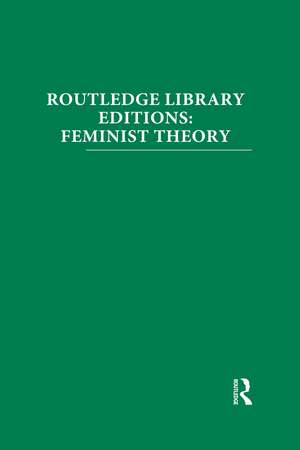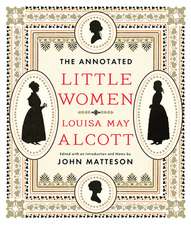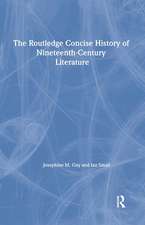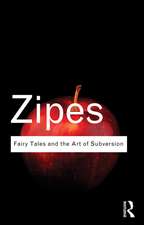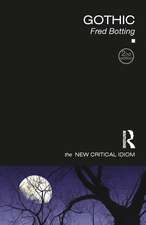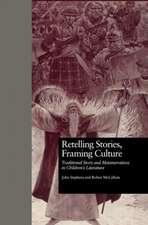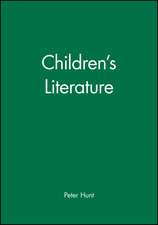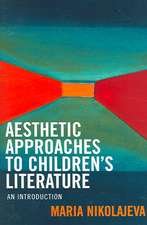Routledge Library Editions: Feminist Theory: Routledge Library Editions: Feminist Theory
Editat de Variousen Limba Engleză Hardback – 11 oct 2012
Din seria Routledge Library Editions: Feminist Theory
- 36%
 Preț: 626.41 lei
Preț: 626.41 lei - 16%
 Preț: 298.01 lei
Preț: 298.01 lei - 37%
 Preț: 622.99 lei
Preț: 622.99 lei -
 Preț: 411.42 lei
Preț: 411.42 lei -
 Preț: 483.55 lei
Preț: 483.55 lei - 38%
 Preț: 767.38 lei
Preț: 767.38 lei - 33%
 Preț: 532.10 lei
Preț: 532.10 lei - 39%
 Preț: 682.29 lei
Preț: 682.29 lei - 18%
 Preț: 782.30 lei
Preț: 782.30 lei - 37%
 Preț: 625.33 lei
Preț: 625.33 lei - 37%
 Preț: 623.71 lei
Preț: 623.71 lei - 36%
 Preț: 825.25 lei
Preț: 825.25 lei - 36%
 Preț: 626.94 lei
Preț: 626.94 lei - 38%
 Preț: 767.20 lei
Preț: 767.20 lei - 36%
 Preț: 626.59 lei
Preț: 626.59 lei -
 Preț: 349.58 lei
Preț: 349.58 lei - 36%
 Preț: 827.76 lei
Preț: 827.76 lei -
 Preț: 413.33 lei
Preț: 413.33 lei - 22%
 Preț: 326.81 lei
Preț: 326.81 lei - 33%
 Preț: 771.88 lei
Preț: 771.88 lei -
 Preț: 415.29 lei
Preț: 415.29 lei -
 Preț: 414.91 lei
Preț: 414.91 lei - 38%
 Preț: 769.00 lei
Preț: 769.00 lei - 36%
 Preț: 626.22 lei
Preț: 626.22 lei - 37%
 Preț: 625.68 lei
Preț: 625.68 lei - 38%
 Preț: 767.74 lei
Preț: 767.74 lei - 36%
 Preț: 626.94 lei
Preț: 626.94 lei - 37%
 Preț: 622.99 lei
Preț: 622.99 lei - 36%
 Preț: 826.15 lei
Preț: 826.15 lei -
 Preț: 417.20 lei
Preț: 417.20 lei
Preț: 10562.98 lei
Preț vechi: 16266.30 lei
-35% Nou
Puncte Express: 15844
Preț estimativ în valută:
2021.46€ • 2195.02$ • 1698.03£
2021.46€ • 2195.02$ • 1698.03£
Carte tipărită la comandă
Livrare economică 22 aprilie-06 mai
Preluare comenzi: 021 569.72.76
Specificații
ISBN-13: 9780415534017
ISBN-10: 0415534011
Pagini: 7712
Dimensiuni: 156 x 234 mm
Greutate: 14.43 kg
Ediția:1
Editura: Taylor & Francis
Colecția Routledge
Seria Routledge Library Editions: Feminist Theory
Locul publicării:Oxford, United Kingdom
ISBN-10: 0415534011
Pagini: 7712
Dimensiuni: 156 x 234 mm
Greutate: 14.43 kg
Ediția:1
Editura: Taylor & Francis
Colecția Routledge
Seria Routledge Library Editions: Feminist Theory
Locul publicării:Oxford, United Kingdom
Public țintă
AcademicCuprins
At the Boundaries of Law: Feminism and Legal Theory Martha Albertson Fineman & Nancy Sweet Thomadsen. Between Men and Feminism David Porter. Coming to Terms: Feminism, Theory, Politics Elizabeth Weed. Contemporary Western European Feminism Gisela Kaplan. Disputed Subjects: Essays on Psychoanalysis, Politics, and Philosophy Jane Flax. Ethics and Human Reproduction: A Feminist Analysis Christine Overall. Feminism and Materialism: Women and Modes of Production Annette Kuhn & AnnMarie Wolpe. Feminism for Girls: An Adventure Story Angela McRobbie & Trisha McCabe. Feminism in France: From May '68 to Mitterand Claire Duchen. Feminist Criticism and Social Change: Sex, Class and Race in Literature and Culture Judith Newton & Deborah Rosenfelt. Feminist Experiences: The Women's Movement in Four Cultures Susan Bassnett. Feminist Knowledge: Critique and Construct Sneja Gunew. Feminist Praxis: Research, Theory and Epistemology in Feminist Sociology Liz Stanley. Feminists and State Welfare Jennifer Dale & Peggy Foster. Feminists Read Habermas: Gendering the Subject of Discourse Johanna Meehan. Gendered Subjects: The Dynamics of Feminist Teaching Margo Culley & Catherine Portuges. Goodbye Tarzan: Men after Feminism Helen Franks. In Other Words: Writing as a Feminist Gail Chester & Sigrid Nielsen. Julia Kristeva John Lechte. Married to the Job: Wives' Incorporation in Men's Work Janet Finch. Materialist Feminism and the Politics of Discourse Rosemary Hennessy. Men in Feminism Alice Jardine & Paul Smith. Nostalgia and Sexual Difference: The Resistance to Contemporary Feminism Janice Doane & Devon Hodges. Problems for Feminist Criticism Sally Minogue. Science and the Construction of Women Mary Maynard. Subordination: Feminism and Social Theory Clare Burton. Tearing the Veil: Essays on Femininity Susan Lipshitz. The Horned God: Feminism and Men as Wounding and Healing John Rowan. The Liberation of Women: A Study of Patriarchy and Capitalism Roberta Hamilton. The Oppositional Imagination: Feminism, Critique and Political Theory Joan Cocks. The Sceptical Feminist: A Philosophical Enquiry Janet Radcliffe Richards.
Descriere
Routledge Library Editions: Feminist Theory brings together as one set, or individual volumes, a series of previously out-of-print classics from a variety of academic imprints.
Notă biografică
Various authors.
Original Series Editors:
David Canter is Emeritus Professor at The University of Liverpool, UK. Having set up the first MSc in Environmental Psychology at The University of Surrey in 1972, he went on to establish the Journal of Environmental Psychology in 1980, editing it for 20 years. Soon after he founded the International Association of People-Environment Studies (IAPS). David has published widely on many aspects of human interactions with their surroundings; his 1977 book The Psychology of Place, being one of the most cited publications in the area.
David Stea is Professor Emeritus of Geography and International Studies at Texas State University and Research Associate with the Center for Global Justice in Mexico. As Carnegie Interdisciplinary Fellow at Brown University from 1964 to 1966, he developed the new field of Environmental Psychology and the related study of spatial and geographic cognition. David is a member of the editorial boards of a number of journals, the co-author or co-editor of several books and author of some 150 articles and book chapters on various subjects, including sustainable development and environmental issues in Latin America. In 1987 he was nominated for the Right Livelihood Prize (also known as the “alternative Nobel”) for his international work with indigenous peoples.
Original Series Editors:
David Canter is Emeritus Professor at The University of Liverpool, UK. Having set up the first MSc in Environmental Psychology at The University of Surrey in 1972, he went on to establish the Journal of Environmental Psychology in 1980, editing it for 20 years. Soon after he founded the International Association of People-Environment Studies (IAPS). David has published widely on many aspects of human interactions with their surroundings; his 1977 book The Psychology of Place, being one of the most cited publications in the area.
David Stea is Professor Emeritus of Geography and International Studies at Texas State University and Research Associate with the Center for Global Justice in Mexico. As Carnegie Interdisciplinary Fellow at Brown University from 1964 to 1966, he developed the new field of Environmental Psychology and the related study of spatial and geographic cognition. David is a member of the editorial boards of a number of journals, the co-author or co-editor of several books and author of some 150 articles and book chapters on various subjects, including sustainable development and environmental issues in Latin America. In 1987 he was nominated for the Right Livelihood Prize (also known as the “alternative Nobel”) for his international work with indigenous peoples.
Recenzii
“The timely re-issue of the prescient Ethnoscapes series provides an invaluable contribution to current concerns about built and natural environments. The breadth of coverage of these books, includes public participation in environmental modifications, the impact of housing design on the quality of life, cross-cultural comparisons of placemaking, and the role of building aesthetics on well-being, across many countries and contexts adds up to a treasure trove of innovative research. Now more than ever we need the benefit of the insights and findings of these scholars and professional (many of course who are both) who, over three decades, have studied crucial aspects of interactions between people and their surroundings.”
Ricardo García Mira, Professor of Social Psychology, University of A Coruna, Galicia, Spain. Former Spanish MP.
“The reissued volumes in the Ethnoscapes series were ground- breaking when they first appeared and remain fresh today. These books are essential for understanding how design and the use of space has cultural and human meaning that “artificial intelligence” could never achieve. They offer a vital and timely antidote to mind-numbing apology for the appropriation of civic space and corporate reproduction of McMansions and shopping malls.”
Ben Wisner, Honorary Visiting Professor, University College London, UK.
“The physical aspects of our wonderfully complex world combine with social and psychological factors, to give a myriad of joys and sorrows accompanying our lifeworld activities. To make existence manageable, we need to find order within such chaos. As researchers of all types, but especially social scientists, we are driven to identify networks of causes and effects. This series provides excellent examples of such writing, concerning natural and built environments, from a host of scholars, representing a range of disciplines.”
Andrew Turk, Adjunct Associate Professor, Murdoch University, Western Australia.
“People interested and concerned about how we are interacting with and shaping our built and natural environments will find the insights and findings in this re-issued Ethnoscapes series of great value. Over more than 30 years this accumulated cornucopia of research reveals how important it is to understand the meanings and significance of many aspects of human- environment transactions. These include studies of user involvement in design, with its implications for place-making, as well as crucial explorations of the meaning of home and the role of environmental aesthetics for our wellbeing. Every volume opens new doors, often being the forerunners to major areas of study.”
Arza Churchman, Professor Emerita at Technion- Israel Institute of Technology, Haifa, Israel.
“The re-issue of the Ethnoscapes series provides everyone who cares about human-environment studies a wonderful opportunity to re-acquaint themselves with many groundbreaking efforts in the field. The series provides a wide range of explorations by researchers who have helped to make sense of persons in interaction with their surroundings, and contributed to inspired placemaking”.
Robert Gifford, Professor of Psychology and Environmental Studies, University of Victoria, British Columbia, Canada.
Ricardo García Mira, Professor of Social Psychology, University of A Coruna, Galicia, Spain. Former Spanish MP.
“The reissued volumes in the Ethnoscapes series were ground- breaking when they first appeared and remain fresh today. These books are essential for understanding how design and the use of space has cultural and human meaning that “artificial intelligence” could never achieve. They offer a vital and timely antidote to mind-numbing apology for the appropriation of civic space and corporate reproduction of McMansions and shopping malls.”
Ben Wisner, Honorary Visiting Professor, University College London, UK.
“The physical aspects of our wonderfully complex world combine with social and psychological factors, to give a myriad of joys and sorrows accompanying our lifeworld activities. To make existence manageable, we need to find order within such chaos. As researchers of all types, but especially social scientists, we are driven to identify networks of causes and effects. This series provides excellent examples of such writing, concerning natural and built environments, from a host of scholars, representing a range of disciplines.”
Andrew Turk, Adjunct Associate Professor, Murdoch University, Western Australia.
“People interested and concerned about how we are interacting with and shaping our built and natural environments will find the insights and findings in this re-issued Ethnoscapes series of great value. Over more than 30 years this accumulated cornucopia of research reveals how important it is to understand the meanings and significance of many aspects of human- environment transactions. These include studies of user involvement in design, with its implications for place-making, as well as crucial explorations of the meaning of home and the role of environmental aesthetics for our wellbeing. Every volume opens new doors, often being the forerunners to major areas of study.”
Arza Churchman, Professor Emerita at Technion- Israel Institute of Technology, Haifa, Israel.
“The re-issue of the Ethnoscapes series provides everyone who cares about human-environment studies a wonderful opportunity to re-acquaint themselves with many groundbreaking efforts in the field. The series provides a wide range of explorations by researchers who have helped to make sense of persons in interaction with their surroundings, and contributed to inspired placemaking”.
Robert Gifford, Professor of Psychology and Environmental Studies, University of Victoria, British Columbia, Canada.
